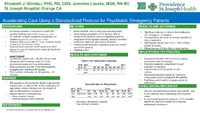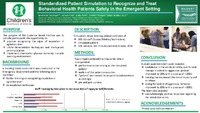Accelerating care using a standardized protocol for psychiatric emergency patients
View File(s)
- Author(s)
- Details
-
Elizabeth Winokur, PhD, RN, CEN; Jeannine Loucks, MSN, RN-BC, PMH
- Sigma Affiliation
- Non-member
Visitor Statistics
Visits vs Downloads
Visitors - World Map
Top Visiting Countries
| Country | Visits |
|---|
Top Visiting Cities
| City | Visits |
|---|
Visits (last 6 months)
Downloads (last 6 months)
Popular Works for Winokur, Elizabeth J. by View
| Title | Page Views |
|---|
Popular Works for Winokur, Elizabeth J. by Download
| Title | Downloads |
|---|
View Citations
Citations
Session D presented Friday, September 15, 2017
Purpose: Behavioral health (BH) complaints are a component in one out of every eight emergency department visits. With the closing of many inpatient psychiatric beds, emergency departments are the primary source care for many individuals experiencing a behavioral health crisis. Often assessment and care for BH patients is delayed to provide care to medical patients who are perceived to be more acutely ill. Emergency nurses are frequent recipients of aggression and violence from this population. Research findings demonstrate that most acts of aggression and violence occur within one hour of arrival in ED. Therefore delays in care may exacerbate the risk for aggression or violence. Expediting care for behavioral health and other patients experiencing emotional crises is essential in the emergency department to prevent increasing agitation and/or aggression. This project developed by a multi-disciplinary team used a standardized protocol to provide definitive care, including medications, before being seen by the physician.
Design: This quality improvement project was instituted In response to increasing numbers of BH patients presenting to a busy emergency department. Its goal was to reduce risk of agression and violence through prompt initiation of definitive care.
Setting: Community hospital in Southern California.
Participants/Subjects: All ED staff have been trained and participate in this project.
Methods: A team composed of staff nurses, ED leadership, and physician examined issues and proposed solutions to improve timeliness of care for the BH population with a secondary goal of reducing acts of aggression and restraint use. As allowed by California Board of Registered Nursing, a standardized procedure (STP) allowing ED nurses to assess and order medication for anxiety or aggression was developed. Subsequent to approval by multiple hospital, physician, and interdisciplinary practice committees the procedure was instituted. Emergency staff nurses received extensive education, both in groups and one-on-one to train them in the use of the procedure. Competency was documented prior to the nurse being able to institute the STP.
Results/Outcomes: Time to medication for anxiety and agitation has decreased from 43 minutes to an average of 19 minutes. The implementation of the STP has also resulted in a 50% decline in the number of restraint episodes. For those in restraints, time in restraints has significantly decreased. The number of code grays has demonstrated overall reduction.
Implications: Use of a STP is an effective method for the nurse to autonomously assess and immediately begin treatment of patients with signs of anxiety and aggression, and thus reduce risk for violence. An additional benefit is earlier initiation of therapeutic BH care and reduced time to disposition. This process can be replicated in other emergency departments through the use of a standardized procedure or protocol based on state regulations.
ENA 2017: Education, Networking, Advocacy. Held at America's Center Convention Center, St. Louis, Missouri, USA
Items submitted to a conference/event were evaluated/peer-reviewed at the time of abstract submission to the event. No other peer-review was provided prior to submission to the Henderson Repository, unless otherwise noted.
| Type | Poster |
| Acquisition | Proxy-submission |
| Review Type | Abstract Review Only: Reviewed by Event Host |
| Format | Text-based Document |
| Evidence Level | N/A |
| Research Approach | N/A |
| Keywords | Quality Improvement; Behavioral Health; Emergency Department |
| Name | Emergency Nursing 2017 |
| Host | Emergency Nurses Association |
| Location | St. Louis, Missouri, USA |
| Date | 2017 |
All rights reserved by the author(s) and/or publisher(s) listed in this item record unless relinquished in whole or part by a rights notation or a Creative Commons License present in this item record.
All permission requests should be directed accordingly and not to the Sigma Repository.
All submitting authors or publishers have affirmed that when using material in their work where they do not own copyright, they have obtained permission of the copyright holder prior to submission and the rights holder has been acknowledged as necessary.
Related items
Showing items related by title, author, creator and subjects.
-
Initiation of a HIV screening protocol and pathway in the emergency department: A quality improvement initiative
Davis, Kristina Anne (11/9/2017)There is currently a nationwide campaign to address human immunodeficiency virus (HIV) prevention and treatment. The emergency department (ED) is a significant venue in the HIV prevention and treatment campaign. The quality ... -
A picture is worth a thousand words: Using pictographs to address limited health care literacy
Winokur, Elizabeth J. (2016-03-21)Session presented on Monday, November 9, 2015 and Tuesday, November 10, 2015: Limited healthcare literacy hinders care provision and contributes to worse patient outcomes. Inability to comprehend discharge instructions ... -
Utilizing cognitive behavioral therapy, token economy technique to positively impact boarding of pediatric psychiatric patients
Crider, Crystal; Rivera, Luna Sanchez; Beaver, Beth; O'Rourke, Sarah; Mooneyham, GenaLynne C.; White, AnnRecent US data estimates 5% to 7% of pediatric ED visits are related to mental health. The most common mental disorders diagnosed in childhood are Tourette syndrome, attention-deficit/hyperactivity (ADHD), behavior, mood, ... -
Standardized patient simulation to recognize and treat behavioral health patients safely in emergent settings
Goodwin, NandranieIncreasing complex behavioral health visits to the Emergency Department necessitated comprehensive inter-professional team training to ensure therapeutic behavioral patient management. The purpose of this training was to ... -
Emergency department bedside handoff report for increased communication and patient experience: A quality improvement health program
Muller, MickeyBackground: With increased emphasis placed on patient experience scores within hospital emergency departments (ED), communication between clinicians and patients has been identified as an area for improvement. Described ...





